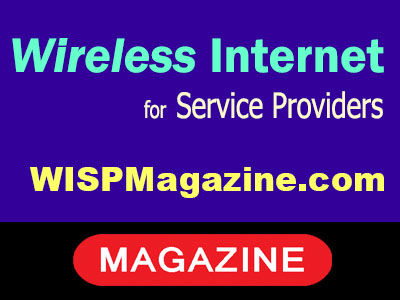By: The Carmel Group’s Jimmy Schaeffler
 In 2017 and 2018, with the help of several quite knowledgeable industry colleagues, I brainstormed and, for many months, seriously investigated the idea of starting my own new broadband operation in Northern California. Most of the earliest stages were dedicated to a planned 2020 launch, using a fixed wireless access (FWA) model. We would call it MCBB, an acronym for Monterey County Broadband.
In 2017 and 2018, with the help of several quite knowledgeable industry colleagues, I brainstormed and, for many months, seriously investigated the idea of starting my own new broadband operation in Northern California. Most of the earliest stages were dedicated to a planned 2020 launch, using a fixed wireless access (FWA) model. We would call it MCBB, an acronym for Monterey County Broadband.
Challenging Competition
Competing against me on my new turf, the Monterey Peninsula and points mostly east and south, were many longtime incumbents, like AT&T, Charter, and Comcast. At the time, the cadre of these deepest-of-deep pocketed corporate telecom behemoths were offering their new local broadband subscribers basic new customer internet connections via landlines for quite a bit more than I estimated I could offer new subs/month, including a $60 – $125+ installation and $3-10/monthly modem fees. But they could not offer “true local” in-county personnel to answer phones, to do budgets and bookkeeping, and to accomplish a myriad of other chores a small-to-midsized local business does with the care and passion of a “neighbor.” My lower cost, and that “locality” factor, would be among my true best advantages.
My long days, lots of travel, and many months of planning amounted to lots of meetings, and a large binder or two full of documents, many of which were budgeting spreadsheets. These estimated and planned the multi-year profits and losses for my new system, MCBB.
All that came to an end, quickly, however, a several months later. Two of the bigger competitors caught wind of my investigations, and instantly — and at the same time, rather mysteriously –, both substantially lowered the costs of their basic broadband packages for new subscribers, to much less than before. That then essentially drove my budgets, estimates, and ROI plans and planning out the door. At that point, no matter how I massaged my Excel skills and chartwork, the math just no longer worked. Any possible planned-for profit, even long term, fighting against these financially buttressed telco and cable giants, got so far out of reach, that no rational businessperson would proceed. As a result, despite my hundreds of hours of efforts and my own investment of several thousand dollars, I had to succumb to the lot of a “rational businessperson.” Indeed, I had to walk away.
And Regulatory Competition…
Surprisingly, one of the lessons I learned, too, was that in addition to steep competition, I also had additional built-in costs, plus expenditures of time and effort, wedded to adhering to local, state, and federal regulations and policies. And no doubt, those regs seemed then as they seem now: clearly stacked against the little guy, especially the small-to-midsized FWA newcomers. It seemed so ironic: just as so many rural and remote folks needed broadband more than ever, the wireless entities that could best provide it for them, competitively, like my MCBB, were being shackled and often overwhelmed before they could even get out of the gates.
Examples of those regulatory and policy restrictions and extra costs included those applied to standard items like raising funds, labeling, paying taxes, special fees, equipment surcharges, mapping, reporting, and even establishing and maintaining a must-have website. Other obstacles included special permits for access across tribal and historical sites, restrictions on use of spectrum frequencies around schools and other governmental facilities, special business and safety licenses, plus intellectual property and privacy mandates en masse. Further, we found that simple delay itself was often another special regulatory charge. An example was MCBB being unable to launch and unable to then start becoming profitable, because of bureaucratic stalls. And so many of these things that were such an impediment to success for a greenhorn like me, were but tiny burrs in the saddles of the rival big broadband buckeroos. MCBB also found that those same competitors had large lobbies at the state and federal levels, which meant those opponents often had subtle and not-so-subtle advantages, often slyly crafted into legislation that affected all of us.
Also, because my tower would be on top of the hill to the south of the local regional airport, Federal Aviation Administration (FAA) guidelines, fees, and requirements were a concern. Plus, county and state permits for the placement and camouflaging of my towers was also a probability.
And Today, Competition From Awkward Government Funding…
Bringing this point of unwieldy regulations full circle today, is the lopsided current National Telecommunications and Information Administration (NTIA) decision to withhold funding for unlicensed spectrum operators as part of the upcoming Broadband Equity Access and Deployment (BEAD) grants. This has happened because the NTIA oddly and irrationally labeled unlicensed frequencies as “unreliable.” As noted by WISP Magazine colleagues in this issue, unlicensed spectrum is everything but unreliable! As but one example of the improvements Congress can today make toward growing reliable broadband in America today, it should insist the Biden Administration re-label unlicensed spectrum as actually quite reliable, and thus enable further funding for those FWA operators who deliver such a critical component to broadband success in this nation. Our country needs to stop kneecapping the newer and smaller unlicensed FWA operators, by giving their competitors advantages and funding that the Executive Branch – based upon politics and illogic – won’t give to them.
One of today’s better-run small FWA operators, Susan Myers, the Eastern Carolina Broadband Managing Partner, aptly concludes, “Government has to get a lot better at including, rather than excluding, the heartbeat of our economy today. Those are small businesses.” Summarizes Myers, “Let us be the right tool for the job. We don’t disappoint.”
 Jimmy Schaeffler is a 52-year veteran of the world’s telecom industries, today including the pay TV, broadcast, and streaming telecom sectors; he is also the Chairman & CSO of the globally-recognized consultant and publisher, The Carmel Group (www.carmelgroup.com).
Jimmy Schaeffler is a 52-year veteran of the world’s telecom industries, today including the pay TV, broadcast, and streaming telecom sectors; he is also the Chairman & CSO of the globally-recognized consultant and publisher, The Carmel Group (www.carmelgroup.com).

